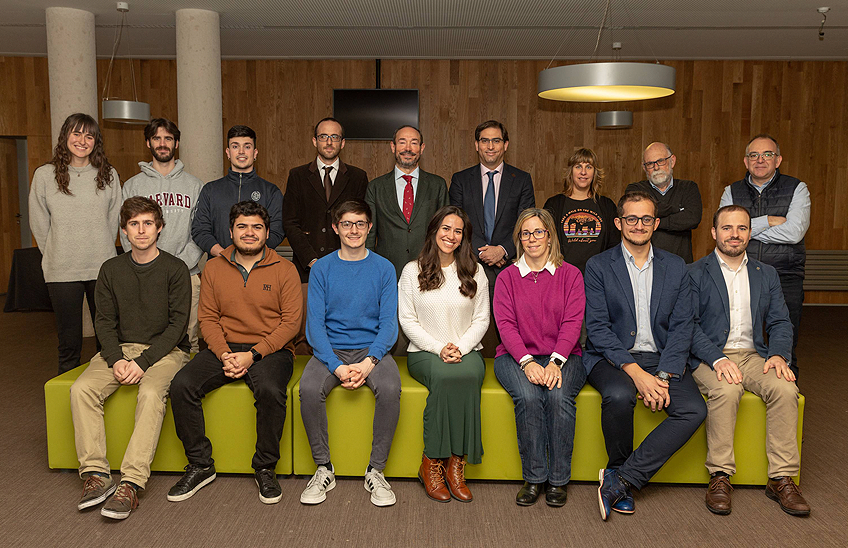News
LATEST NEWS AND EVENTS FROM THE SCHOOL OF ENGINEERING
The 1st DATAI University of Navarra awards recognize the application of artificial intelligence to neurological diseases and cancer therapies
The Institute of Data Science and Artificial Intelligence has highlighted the work of researchers Miguel Valencia (Cima) and Francisco Planes (Tecnun-School of Engineering).

PhotoManuelCastells/The director of the Data Science and Artificial Intelligence Institute of the University of Navarra DATAI, Jesús López Fidalgo, with the awarded researchers, Miguel Valencia and Francisco Planes, and their teams.
23 | 02 | 2023
The projects of the researchers Miguel Valencia Ustárroz, of the Cima; and Francisco Planes Pedreño, Full Professor of Tecnun-School of Engineering, have been recognized in the first edition of the awards of the Data Science and Artificial Intelligence Institute of the University of Navarra (DATAI). These projects highlight the application of data science in an interdisciplinary way in the research and treatment of neurological diseases or cancer therapies.
The submission of the awards was attended by the director of DATAI University of Navarra, Jesús López Fidalgo; the Vice President of Office of Academic Affairs, Secundino Fernández; and the director of the Artificial Intelligence and the Future of Management Initiative of IESE Business School, Sampsa Samila.
The goal of the awards, addressed to all DATAI researchers, is to recognize particularly relevant scientific contributions in the field of data science and artificial intelligence. The awards value originality, innovation and contribution with the double goal to encourage research work as well as its projection to society. Each award is endowed with 3,000 euros for the development of the research.
Jesús López Fidalgo valued the quality and multidisciplinarity of the recognized projects and thanked BBVA and the Government of Navarra for their collaboration with DATAI. "It is estimated that by 2030, Artificial Intelligence will significantly influence more than 8.5 billion people, across all sectors on an unprecedented scale. According to a study published in the journal Nature, AI could help achieve 79% of the development Sustainable Goals. From this follows the opportunity to connect research groups working on this topic and leverage different competencies in development and AI," he said.
Miguel Valencia's project , researcher of Cima, belonging to DATAI's area "Health Analytics", uses different methodologies in order to record, analyze and model brain activity in physiological conditions and under the effect of neurological diseases. result of collaboration between life science researchers, clinicians and data scientists, proposes a workflow to train artificial intelligence tools that can automatically detect abnormal events in brain activity recorded by electroencephalogram. "The workflow is easily adaptable to multiple real-world scenarios and was designed with an interactive and user-friendly approach that makes it manageable for clinical and experimental researchers without programming skills. However, it is designed so that data scientists can optimize it for more specific scenarios, improving the transfer of knowledge between different disciplines," he explains.
On the other hand, the research presented by Francis Planes is framed in the field of computational biology and cancer therapies. In the context of precision oncology, they have developed different algorithms to classify patients, identify new therapeutic targets and predict the result of cancer therapies. "One of the great challenges of artificial intelligence is to build robust algorithms that are able to learn from data and not memorize it. For this, selecting the most relevant variables of the problem is a crucial step, especially in the biomedical field where we have information from a limited issue of patients, but thousands of measurable variables. In this contribution, we have developed a new method of variable selection that improves the existing ones in the literature. We have applied it to models for predicting response to cancer therapy, but it can be applied more globally to other problems".
In the lecture that he gave during the event, Sampsa Samila, addressed the artificial intelligence models and their economic impact. He first referred to those that emerged for images up to the current ChatGPT. Samila explained how these models work, which have generated enthusiasm but, at the same time, concern about their potential impact; and the commercial and personal implications they entail.
Transversal, interdisciplinary and service vocation
The Data Science and AI Institute (DATAI) was created in December 2019 with a transversal, interdisciplinary and service vocation. Currently, more than 80 researchers from different faculties and centers of the University of Navarra, and external companies such as BBVA make up the staff of the center. In the last three years, research projects have been developed in different areas.
DATAI has worked with companies, including BBVA, Gamesa, AIN, INFOPERMIT or Human AI; and institutions such as the Ministry of Science and the Departments of the Government of Navarra for Universities, Industry, Economics and Justice and Immigration. More than 300 people have been trained in data science through the Master in Big Data Science and the courses taught from the institute. In addition, 70 BBVA employees have been certified as data scientists and 10 are developing their industrial doctoral dissertation in the Institute's framework .
